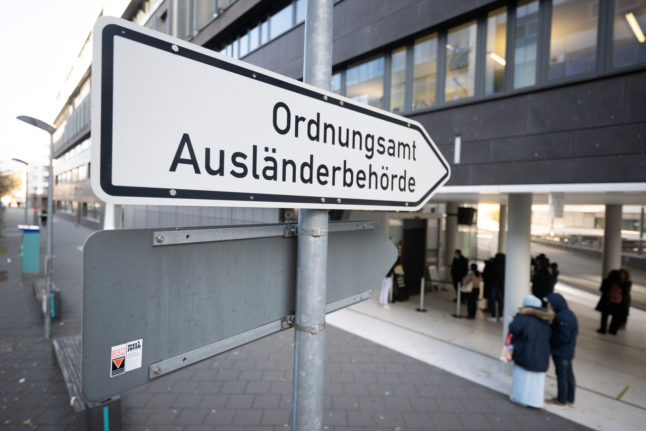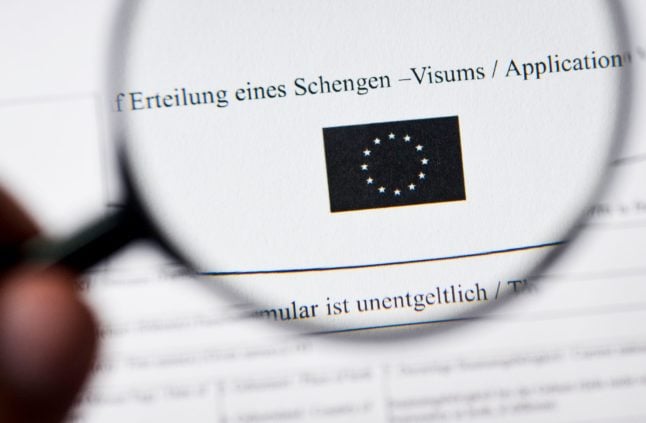How foreigners will be able to bring their families to Germany under new skilled worker law

Under the new Skilled Worker Immigration Act, foreigners in Germany will not only be able to reunify with their spouses and children, but also their parents and step-parents as well.
On June 23rd, the German Bundestag passed one of the most wide-reaching reforms of immigration law the country has seen for several years.
With lower salary threshold for Blue Cards and a new points-based system for those with professional qualifications, the changes are designed to create smoother and less bureaucratic routes for skilled workers to relocate to Germany.
In the latest changes to the some 100-page draft law, the Interior Ministry has inserted a clause that will significantly liberalise family reunification for workers in Germany.
Previously, foreigners with certain types of residence permit could bring their spouse or registered partner to Germany, as well as their underage or dependent children.
But in a last-minute addition the sweeping immigration reforms, the coalition government has broadened this out to include foreigners' parents and parents-in-law. These are the key changes we know about so far:
- Parents and parents-in-law will be permitted alongside spouses and children under 18
- Skilled workers will no longer have to prove their have sufficient space to house their family
- The application process should be streamlined and simplified
- For people with certain types of EU-wide residence permit, reunification permits will be expedited
The changes, although not in place yet, bring German law closer to EU immigration law, which allows reunification with parents from non-EU countries in an EU country provided they are dependent on their child for support, i.e. in cases of illness or disability. However, there is no suggestion that these conditions would be attached to a reunification application under the new German law.
Who is entitled to family reunification under German law?
Under the original Skilled Workers Immigration Act, which was passed in March 2020 by the previous coalition government, skilled workers in Germany can bring relatives to join them if they have one of the following permits:
- An EU Blue Card, a Mobile Inter-corporate Transferee (ICT) Card, or an EU Permanent Residence Card, or
- A German residence permit or permanent residence permit.
According to the Interior Ministry, people who want to bring their parents or parents-in-law to join them will need to have entered the country on a residence permit on or after March 1st, 2024.
READ ALSO: 8 things to know about Germany's new skilled worker immigration law
What are the conditions for applying for family reunification?
There are some complexities and variations in the way the law treats people with different nationalities, but ultimately the main prerequisite is the same: proving you can support your relatives once they join you in Germany.
Under current law, this includes proving your salary can support you, your spouse, children and parents (if required), and that the living space you have is "sufficient" for all of these family members.
In terms of living space, the general rule of thumb is that your apartment or house should offer at least 12 square metres of living space per family member over the age of six, and 10 square metres for each family member under the age of six. This can't include living space that is used or shared by third parties.
However, the Interior Ministry has confirmed to The Local that, in future, foreigners who want to bring their spouse or underage children to Germany will no longer be required to prove they have adequate living space. These relaxed rules will come into force when the new law is implemented.

A sign points to the Foreigners' Authority and the Public Order Office in Frankfurt am Main. Photo: picture alliance/dpa | Sebastian Gollnow
Under current rules, you should also have statutory health insurance that your family members can share.
Your spouse should have at least A1 German, and children under the age of 18 should not be married, divorced or widowed.
It's worth noting, however, that some of these requirements may change further when the law comes into force. It's so far unclear, for example, if parents and parents-in-law will also have to prove basic German language skills, or whether this requirement will be scrapped.
Nevertheless, the requirement to be able to support your family will remain in place.
How does the process work?
At the moment, relatives who want to apply for family reunification have to apply for a family reunification visa at their local consulate or embassy in their home country.
They will first need to fill in an application form and provide a number of documents, including their passport, a passport photo, marriage certificate and proof of language skills (if needed), a copy of their partner's residence permit and proof of sufficient income and living space.
After a visa is issued, family members can travel to Germany and register as a resident at their local Bürgeramt.
As mentioned, the requirement to prove sufficient living space will be dispensed with in future, but it's likely that most other aspects of the process are likely to remain the same.
READ ALSO: German Bundestag passes sweeping immigration reforms bill
In what ways will family reunification be streamlined and sped up?
It's unclear if the process will be made easier for everyone in the future, but the latest version of the Skilled Worker Immigration Act does mention certain deadlines for issuing visas for the family members of foreigners with certain types of visas.
Specifically, people applying for an EU permit such as a Blue Card, ICT Card or Mobile ICT Card can submit an application for their family members at the same time as they submit their visa application, and both applications must be decided on at the same time.

An application form for a Schengen visa. Photo: picture alliance / dpa | Ole Spata
In cases where the applicant previously held an EU Blue Card from another member state, and if family members will enter Germany after the Blue Card has been issued, authorities must decide on their application within 30 days - except in "exceptional circumstances".
That would considerably speed up the process of family reunification, assuming - and this is a big assumption - that authorities can keep abreast of all the applications they receive.
READ ALSO: Germany or Austria: Where is it easier to get an EU Blue Card?
When will the new rules come into force?
Following the Bundestag's approval for the new law on June 23rd, it will be voted on by the Bundesrat on July 7th - just before the summer recess.
If all goes to plan, it means that the bill will then be sworn into law by the President, with the bedding-in period starting in the autumn or winter of 2023. A spokesperson for the Interior Ministry has confirmed that the law should then enter into force in March 2024.
Comments
See Also
On June 23rd, the German Bundestag passed one of the most wide-reaching reforms of immigration law the country has seen for several years.
With lower salary threshold for Blue Cards and a new points-based system for those with professional qualifications, the changes are designed to create smoother and less bureaucratic routes for skilled workers to relocate to Germany.
In the latest changes to the some 100-page draft law, the Interior Ministry has inserted a clause that will significantly liberalise family reunification for workers in Germany.
Previously, foreigners with certain types of residence permit could bring their spouse or registered partner to Germany, as well as their underage or dependent children.
But in a last-minute addition the sweeping immigration reforms, the coalition government has broadened this out to include foreigners' parents and parents-in-law. These are the key changes we know about so far:
- Parents and parents-in-law will be permitted alongside spouses and children under 18
- Skilled workers will no longer have to prove their have sufficient space to house their family
- The application process should be streamlined and simplified
- For people with certain types of EU-wide residence permit, reunification permits will be expedited
The changes, although not in place yet, bring German law closer to EU immigration law, which allows reunification with parents from non-EU countries in an EU country provided they are dependent on their child for support, i.e. in cases of illness or disability. However, there is no suggestion that these conditions would be attached to a reunification application under the new German law.
Who is entitled to family reunification under German law?
Under the original Skilled Workers Immigration Act, which was passed in March 2020 by the previous coalition government, skilled workers in Germany can bring relatives to join them if they have one of the following permits:
- An EU Blue Card, a Mobile Inter-corporate Transferee (ICT) Card, or an EU Permanent Residence Card, or
- A German residence permit or permanent residence permit.
According to the Interior Ministry, people who want to bring their parents or parents-in-law to join them will need to have entered the country on a residence permit on or after March 1st, 2024.
READ ALSO: 8 things to know about Germany's new skilled worker immigration law
What are the conditions for applying for family reunification?
There are some complexities and variations in the way the law treats people with different nationalities, but ultimately the main prerequisite is the same: proving you can support your relatives once they join you in Germany.
Under current law, this includes proving your salary can support you, your spouse, children and parents (if required), and that the living space you have is "sufficient" for all of these family members.
In terms of living space, the general rule of thumb is that your apartment or house should offer at least 12 square metres of living space per family member over the age of six, and 10 square metres for each family member under the age of six. This can't include living space that is used or shared by third parties.
However, the Interior Ministry has confirmed to The Local that, in future, foreigners who want to bring their spouse or underage children to Germany will no longer be required to prove they have adequate living space. These relaxed rules will come into force when the new law is implemented.

Under current rules, you should also have statutory health insurance that your family members can share.
Your spouse should have at least A1 German, and children under the age of 18 should not be married, divorced or widowed.
It's worth noting, however, that some of these requirements may change further when the law comes into force. It's so far unclear, for example, if parents and parents-in-law will also have to prove basic German language skills, or whether this requirement will be scrapped.
Nevertheless, the requirement to be able to support your family will remain in place.
How does the process work?
At the moment, relatives who want to apply for family reunification have to apply for a family reunification visa at their local consulate or embassy in their home country.
They will first need to fill in an application form and provide a number of documents, including their passport, a passport photo, marriage certificate and proof of language skills (if needed), a copy of their partner's residence permit and proof of sufficient income and living space.
After a visa is issued, family members can travel to Germany and register as a resident at their local Bürgeramt.
As mentioned, the requirement to prove sufficient living space will be dispensed with in future, but it's likely that most other aspects of the process are likely to remain the same.
READ ALSO: German Bundestag passes sweeping immigration reforms bill
In what ways will family reunification be streamlined and sped up?
It's unclear if the process will be made easier for everyone in the future, but the latest version of the Skilled Worker Immigration Act does mention certain deadlines for issuing visas for the family members of foreigners with certain types of visas.
Specifically, people applying for an EU permit such as a Blue Card, ICT Card or Mobile ICT Card can submit an application for their family members at the same time as they submit their visa application, and both applications must be decided on at the same time.

In cases where the applicant previously held an EU Blue Card from another member state, and if family members will enter Germany after the Blue Card has been issued, authorities must decide on their application within 30 days - except in "exceptional circumstances".
That would considerably speed up the process of family reunification, assuming - and this is a big assumption - that authorities can keep abreast of all the applications they receive.
READ ALSO: Germany or Austria: Where is it easier to get an EU Blue Card?
When will the new rules come into force?
Following the Bundestag's approval for the new law on June 23rd, it will be voted on by the Bundesrat on July 7th - just before the summer recess.
If all goes to plan, it means that the bill will then be sworn into law by the President, with the bedding-in period starting in the autumn or winter of 2023. A spokesperson for the Interior Ministry has confirmed that the law should then enter into force in March 2024.
Join the conversation in our comments section below. Share your own views and experience and if you have a question or suggestion for our journalists then email us at [email protected].
Please keep comments civil, constructive and on topic – and make sure to read our terms of use before getting involved.
Please log in here to leave a comment.